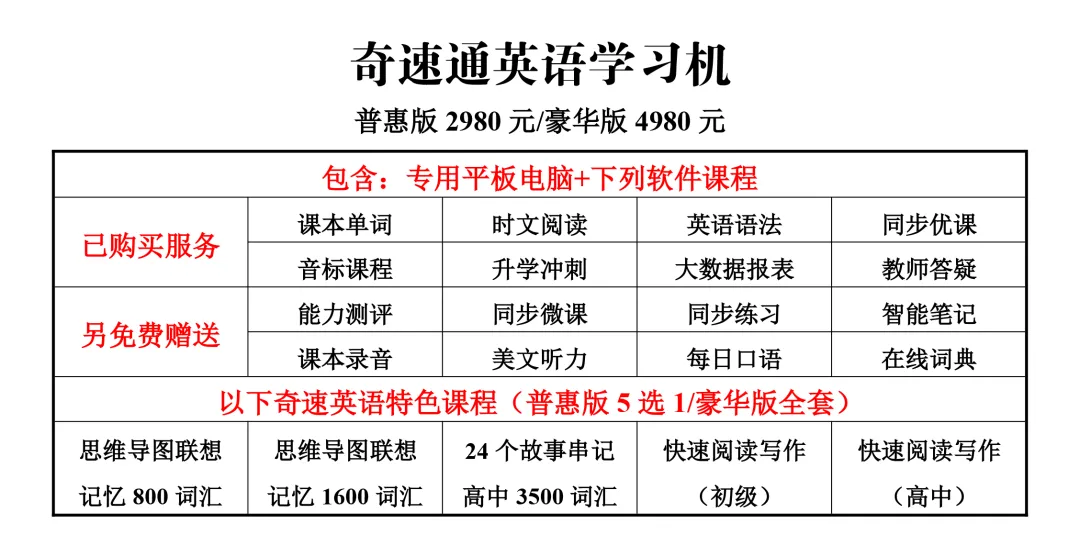一般现在时有两层意思:(其一)就是表示经常性和习惯性的动作或状态;(其二)表示客观事实、自然现象。
一般现在时是英语动词的主要用法之一,因此,我们有必要掌握好它。结合2019年的中考题分析,供大家参考。
1. 谓语是be(am/is/are)的一般现在时。
①肯定形式:主语+be+表语(形容词、名词充当表语)。
②否定形式:主语+be+not+表语(形容词、名词充当表语)。
③一般疑问句形式:Be+主语+表语(形容词、名词充当表语)?
肯定回答:Yes,主语+be. 否定回答:No, 主语+ be+not.
—Yes,I am./No,I\\\'m not.
—Yes, he is./No, he isn,t.
④特殊疑问句形式:特殊疑问词+Be开头的一般疑问句?
2. 谓语动词是实义动词(及物动词或不及物动词)的一般现在时。
①肯定形式:“主语+及物动词+宾语”或“主语+不及物动词”。
She has a little brother.
The sun rises in the east.
②否定形式:“主语+don\\\'t/doesn\\\'t+及物动词+宾语”或“主语+don\\\'t/doesn\\\'t+不及物动词”。
She doesn\\\'t have a little brother.
I don\\\'t eat every morning.
③一般疑问句形式:“Do/Does+主语+及物动词原形+宾语”或“Do/Does+主语+不及物动词原形”。
肯定回答:Yes,主语+do/does. 否定回答是:No, 主语+ don\\\'t/doesn\\\'t.
—Do you eat every morning?
—Yes, I do./No, I don\\\'t.
—Does she have a little brother?
—Yes, she does./No, she doesn\\\'t.
④特殊疑问句:特殊疑问词+do/does开头的一般疑问句?
When do you go to school?
3. 谓语是情态动词can/may...+动词原形的一般现在时。
①肯定形式:主语+情态动词can/may.....+动词原形+宾语。
I can finish my homework.
②否定形式:主语+情态动词can/may.....+not+动词原形+宾语。
I can\\\'t finish my homework.
③一般疑问句形式:情态动词Can/May.....+主语+动词原形+主语+宾语。
肯定回答是:Yes,主语+情态动词. 否定回答是:No, 主语+ 情态动词+not.
—Can you finish your homework?
—Yes,I can./No, I can\\\'t.
④特殊疑问句形式:特殊疑问词+情态动词can/may.....开头的一般疑问句?
注意:情态动词can/may.....+动词原形。
1. 一般现在时表示现在的状态 ;表示经常性或习惯性的动作;表示主语具备的性格和能力;表示客观事实或普遍真理等。例如:
I go to school at seven every day.
2. 一般现在时常和表示时间的频度副词连用。如:often, usually, sometimes, always, never等。例如:
I often read books in the evening.
Do they usually go to school by bike?
He doesn’t like milk. He never drinks it.
Sometimes my mother gets back at five.
3. 一般现在时也常和以下时间表达法连用。如:in the morning, in the afternoon, in the evening, at noon, at night, every day, on Sunday(s), at seven 等。例如:
Do they have math in the morning?
She sleeps nine hours every night.
It takes me two hours to do my homework every day.
They don’t have classes on Sundays.
a. 下列瞬时动词come, go, arrive, leave, start, begin, return的一般现在时可以表示将来,主要用来表示在时间上已确定或安排好的事情。
例如:The train leaves at six tomorrow morning. 火车明天上午六点开。
----When does the bus star? 汽车什么时候开?
----It stars in ten minutes. 十分钟后。
b. 在主从复合句中,当主句是一般将来时,时间或条件状语从句的谓语动词只能用一般现在时来表示将来要发生的动作,即所谓的“主将从现”。
例如:When Bill comes (不是will come), ask him to wait for me. 比尔来后,让他等我。
I\\\'ll write to you as soon as I arrive there. 我到了那里,就写信给你。
2. 在以字母s, x,ch,sh,o结尾的动词后加-es
练习及答案
(2019北京) Sam ______with his friends every weekend.
A. skates B. is skating C. has skated D. was skating
【析】正确答案:A 。句意是:每个周末,山姆都和朋友们一起滑冰。根据句末的频度副词短语every weekend(每周末)可知,句子表示的动作具有经常性,所以动词应使用一般现在时。
(2019青海)----What did you learn in geography yesterday?
----I learned that the sun _____ in the east.
A. was rising B.rises C.rose
【析】正确答案:B。句意是:昨天的地理课上你学了什么? 我学了太阳从东边升起来。太阳从东边升起来,表示的客观事实,一种自然现象,所以,句中的动词应使用一般现在时,因此,正确答案为B。
(2019山东临沂)---I\\\'m getting hungry. Do you know where we can get some good food?
--- Of course! There ____________ a restaurant around the comer.
【析】正确答案:C。句意是:我很饿。你知道哪儿可以弄到吃的吗? 当然!拐角附近有一家饭馆。“拐角附近有一家饭馆”表示的是客观事实,所以句中动词应使用一般现在时。动词be的一般现在时为is。因此,正确答案为C。
-

推荐初高中生学习平板电脑(家教机)一台好的英语学习机一定是孩子自主学习的好帮手、拥有趣味学习的灵魂、具备因材施教精准学的逻辑、涵盖海量资源应有尽有的福利、实现减负增效一步到位的心声。奇速通英语学习机不仅能对中小学生进行英语听说读写诊断,还能帮助孩子尽快适应新学期节奏,激发出孩子们英语单次阅读的学习兴趣。既解决了家长辅导孩子学习之苦,也能进一步提高孩子孩子的学习动力。
适用于家庭首选(书房变培训班),目前无培训班而选择奇速通就相当于把专业和优质的英语教育资源请回家。适用于双减机构转型(可合作代理),目前90%以上的代理商都是孩子受益于奇速通的,于是分享和推广奇速通,所以只要你认可奇速通的理念,看好教育事业,同时你有梦想,有目标,有执行力,就可以订购当校长。
建议初高中生每天抽出10分钟,提升英语阅读素养。
奇速英语时文阅读小程序
这是一款可以随时随地阅读英语的时文阅读软件。
不论你是读小学、初中或高中各年级;
不论你想读记叙文、应用文、议论文、说明文;
不论你想读哪种题型;
不用担心难易程度;
不用去上培训班 ;
英语时文分级读、看世界、学英语。
超100个英语阅读热点话题;
每天实时更新热点文章;
超8000篇原创阅读文章个性化选择。
这款英语阅读软件题材选材同源外报外刊。
需要体验添加老师微信:qisu666888
【特别预告】
奇速英语—基于大数据技术的个性化学习!30篇文章突破英语词汇阅读系列(考研/职教/普教/成人)全部上线,欢迎购买学习、合作代理。
需要咨询老师:


小学初中段:
1.词汇演讲口才拓展训练营(线上课程/线下冬令营)
2.中级英语阅读素养训练营(线上课程/线下冬令营)
3.英语时文分级阅读(软件+月刊)
高中段:
1.高中一本小说24个故事速记3500词汇(线上课程/线下冬令营)
2.高中快速阅读写作营(线上课程/线下冬令营)
3.英语时文分级阅读(软件+月刊)

























